Omara "Bombino" Moctar is out with his seventh album, Sahel, which is named after his homeland. On the project he pays tribute to his fellow Tuareg, who are indigenous to the eponymous African region that runs from the Atlantic Ocean to the Red Sea.
"It looks like where we live is abandoned on purpose," Bombino told NPR's Leila Fadel, speaking in French. "We have to talk about the Sahel through our albums, through our songs, through an understanding of the entire world."
The region has been wracked by violent conflict. Bombino himself has fled his home country of Niger twice due to a series of Tuareg uprisings. Tuareg rebels took up arms against the government, seeking autonomy.
The first time was in the 90s. He was about 12 and just falling in love with the guitar.
During another Tuareg rebellion, in 2007, the government of Niger viewed music as a threat. Two of Bombino's bandmates disappeared. He believes the Nigerien army executed them.
Bombino's family was evacuated from Niamey after the coup in Niger in July. The coup also created logistical and financial challenges for Bombino's band, prompting a GoFundMe campaign from his manager.

Bombino spoke to NPR's Morning Edition about Sahel.
This interview has been translated from French, edited and condensed for clarity. You can listen to this story using the audio player at the top of the page.
Leila Fadel: When you sing in Tamasheq, what is the message you are sending with your music?
Bombino: In our songs, we want to help you understand our Tamasheq culture. The Tuareg are welcoming because we live in the desert, where it's rare to see other people, to have contact with the outside world. Our mission is to tell the whole world that the Tuareg are a welcoming people. It's not like what you see in the media, where you hear about the Tuareg every time there's a rebellion, every time there's a problem.
Playing music in Niger became unsafe. Could you talk about the way that impacted you and your band?
We always say that with conflict, we know how it starts, but we don't know how it ends. That's the true problem with conflict. Each time there's a problem, the vulnerable ones are affected, and in Africa, that's artists. Despite all that, they keep going. But as soon as there's a problem, they are the first who are the victims, regardless of whether they agree or don't agree. In the Sahara, music unites everyone and we feel proud through music.
Your second song on the album, "Alwane," is that about your friends that you lost?
Yes, it talks about the friends we lost. It's really a shame that they're not here today, that they can't enjoy this big success. But at the same time, everything we do and everything we play, it's all thinking about them.
You've lived a nomadic life. And you've been a refugee. What does home mean to you?
The notion of home is really important for any human, from birth to death. Your home is your parents, your grandparents. You have your own origin story. It's about where you grew up. It doesn't really matter about the individual person or the nationality. They're always happy when they go home. And it's really important to not forget where you come from. For me, home is northern Niger. It's in Agadez.
Do you feel a responsibility, being so well known, to create something better for your people?
I do have a sense that when we go out and tour, we have this responsibility to bring to the world a change that we can bring. Because us on the outside can talk about the reality of the things that are going on in the country. It's up to artists to bring the message of peace, of development, of wanting to change as far as possible.
The digital version of this story was edited by Treye Green. The radio version was edited by Olivia Hampton, who also interpreted and translated the interview.
Copyright 2024 NPR



